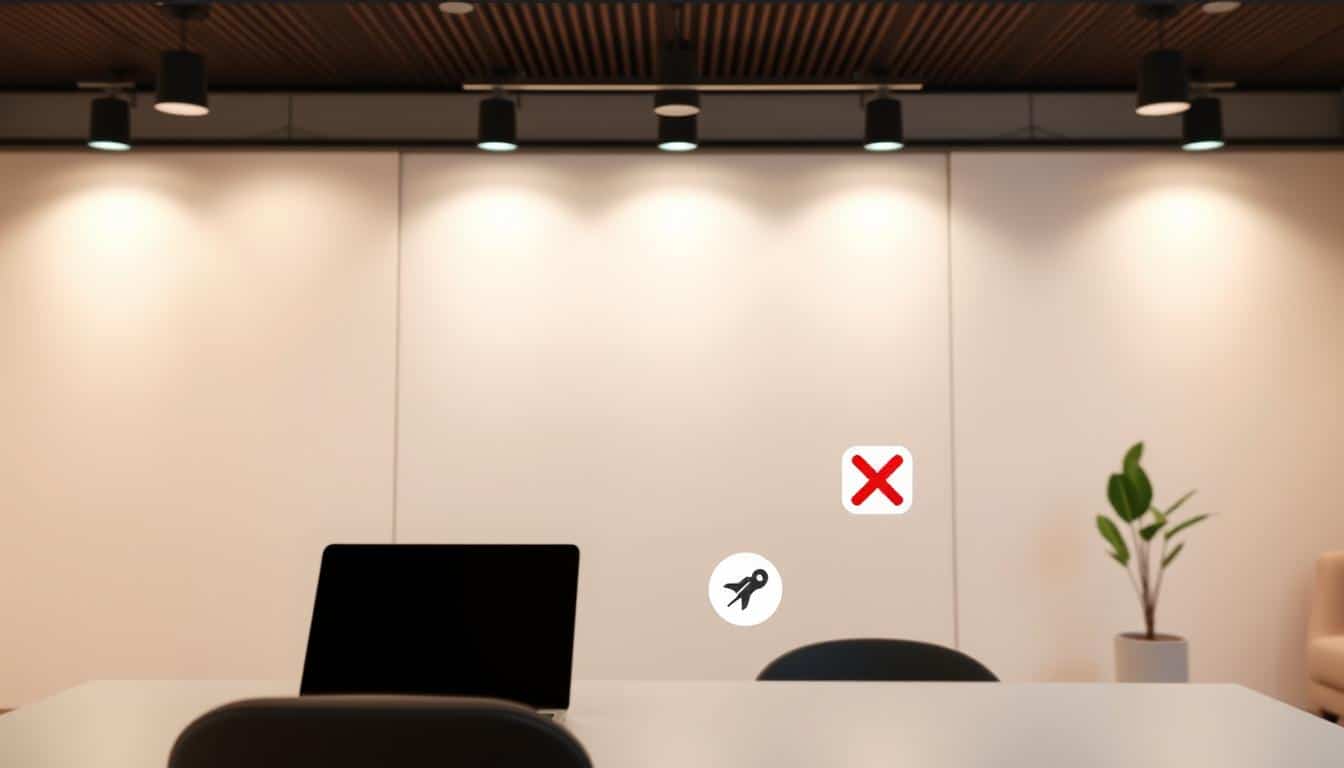In today’s digital age, setting up a professional online meeting space is key to communicating effectively. This piece will share important tips for virtual meetings. These tips will help you show yourself and your ideas clearly and professionally. It’s vital to have good online meeting manners.
This makes teamwork and getting things done easier during web chats. By choosing the right tools and engaging people well, your virtual meetings can become focused talks.
Anúncios
The Importance of a Professional Virtual Meeting Environment
With the mix of office and remote work today, virtual meetings are really important. They bring together teams from different places, making it easier to work together and stay in touch. Having a professional space online can also make everyone work better. People feel more involved and appreciated in well-run online meetings.
Recent findings show that 34% of people like working remotely because old office tech isn’t great. Creating a good online meeting space can fix this issue. With the right tools for online teamwork, businesses can even cut down on how much office space they use by up to 30%. This makes it easier for people to work in ways that suit them best.
Online meeting spaces can feel like real life with 3D technology. This makes everyone feel more together and involved. Virtual meetings are also great for working with teams around the world. For instance, NASA used virtual environments for its Mars Perseverance rover project. This shows how powerful these tools can be for big projects.
Understanding Virtual Meeting Etiquette
Virtual meeting etiquette is about behaving properly during online meetings. This ensures productive talks. It’s important to be professional and respectful. This means adapting how we talk to fit the online setting. It helps to keep meetings clear and without distractions.
What is Meeting Etiquette?
Meeting etiquette makes online talks better. Important aspects include:
- Dressing well for meetings to look sharp.
- Making sure tech and internet work well to avoid problems.
- Choosing the right software for easy talks.
- Having a tidy background to look professional.
- Keeping background noise low and staying focused.
Why Meeting Etiquette Matters
Good meeting etiquette improves the meeting for everyone. A solid internet connection stops delays. Knowing how to use Microsoft Teams or Zoom helps with sharing screens. Virtual backgrounds hide messy places. Being ready with tech means fewer problems. This shows respect and helps everyone focus and work together better.
Essential Tools for Effective Virtual Meetings
The right tools and technology make virtual meetings smooth. The best video conferencing software is key for team communication. Whether team members are in the office or remote, choosing the right audio and video equipment matters. This boosts collaboration and productivity.
Video Conferencing Software
Platforms like Zoom, Microsoft Teams, and Google Meet are top choices for online meetings. They are easy to use and have features like screen sharing and breakout rooms. Zoom can host 100 attendees for 40 minutes for free, perfect for big discussions. Google Meet works well with Google Workspace, making communication smoother.
Audio and Video Equipment
Good audio and video equipment are crucial for clear virtual meetings. A clear microphone and camera make a big difference. Otter.ai provides meeting transcriptions, making it easy to look back at discussions. A setup that reduces distractions helps keep everyone focused.
Meeting Room Layout
Don’t ignore the physical setup for your virtual meetings. A clean and professional background reduces distractions. Use platforms that allow for virtual backgrounds to keep things professional. Tools like Miro make brainstorming creative and fun with collaborative whiteboarding.
Creating a Professional Virtual Meeting Environment
Setting up a professional space for virtual meetings makes them way more effective. A good setup shows you’re serious and cuts down on distractions. This lets everyone focus on the important stuff. Paying attention to your setup helps people communicate better and work together more smoothly.
Choosing the Right Background
It’s best to pick a simple and professional background for your meetings. This keeps everyone focused on the discussion, not on your backdrop. If you can’t find a good spot, use a virtual background to blur out messes. This keeps the focus on you. A clean and tidy background makes the meeting feel more positive.
Lighting and Camera Positioning
Getting the lighting right is key to looking professional in video calls. Place lamps on both sides of your computer to softly light up your face. This setup will make you look better by avoiding harsh shadows. Also, make sure your camera is at eye level. This way, it feels like you’re making eye contact with others, which helps everyone feel connected. Always check your tech before a meeting to make sure your audio and video are clear.
Participant Etiquette and Engagement
Good manners in virtual meetings are key to keeping everyone involved and making the meeting work well. Being a good listener is a big part of this. It helps create a setting where everyone can talk and share important ideas.
Importance of Active Listening
Active listening means really paying attention, not just hearing sounds. It’s about watching and responding in a way that shows you’re involved. Doing things like nodding or looking directly at the speaker helps everyone feel connected.
To be more engaged, remember these tips:
- Joining the meeting on time to respect others’ schedules.
- Introducing themselves to foster an inclusive atmosphere, especially in larger groups.
- Giving their full attention and resisting the urge to multitask to enhance understanding.
- Using digital hand-raise features or vocalizing their desire to speak to maintain order.
- Speaking clearly and concisely to ensure messages are understood.
Dressing Professionally for Virtual Meetings
Looking professional online is just as important as in person. It shows you’re serious about what you’re there to do. Here are some tips to make sure you look your best:
- Choosing a quiet, well-lit space for optimal visibility.
- Ensuring technology is functioning properly to avoid disruptions.
- Establishing clear meeting norms, such as encouraging video use and preparing technical setups in advance.
- Minimizing distractions by informing those around you about the meeting.
- Testing technology beforehand to enhance professionalism and avoid technical issues.
Preparing for Your Virtual Meeting
Planning effective virtual meetings requires careful preparation. A detailed meeting checklist can greatly improve the experience. A good agenda makes sure everyone knows the meeting’s goals and discussion points.
Organizing your meeting enhances productivity. It also increases engagement among team members.
Technical Setup and Equipment Testing
Before your virtual meeting, make sure to set up the tech correctly. Start by checking that your audio and video work well. This step helps avoid technical problems during the meeting.
Tell participants about the platform’s features beforehand. Features like screen sharing and recording can make the meeting better.
Agenda Setting for a Successful Meeting
When creating an agenda, start by defining the meeting’s purpose and goals. Choose participants who are important to the discussion topics. Provide reading materials before the meeting to help discussions and keep everyone informed.
Make sure to plan time for each item on the agenda. This approach ensures detailed discussions without running over time.
Utilizing Video Conferencing Features
Using video conferencing tools well can make online meetings better. Screen sharing and multimedia tools help make things clear and keep people interested. Knowing how to use these tools means you can communicate better and make your presentation go smoothly.
Screen Sharing and Multimedia Tools
Good use of screen sharing can change a virtual presentation for the better. Having a second screen lets presenters keep their meeting stuff separate from other work. This makes things look more organized and professional.
Showing your presentation or documents clearly can really point out the main things and keep everyone paying attention. Good lighting is key for better video. Lights in front help reduce shadows, making everything easier to see.
When you’re setting up your video call, using gallery view for talks with many people makes everyone feel more connected.
Using the Chat Function Effectively
The chat function is a great way to keep everyone involved without stopping the flow of the meeting. You can send messages or ask questions. This helps get feedback or clear up any confusion.
Choosing the right multimedia for your meeting lets everyone work together in real-time. It makes sure everyone understands the purpose of the presentation. Using tools like virtual hand raising or whiteboarding makes meetings more interactive and fun.
Managing Common Virtual Meeting Challenges
Virtual meetings can run into many problems that hurt how well we talk and stay involved. Issues like tech glitches, poor audio or video, and keeping everyone’s attention are common. Getting ready well can help us get past these bumps.
Checking that all gear works before the meeting cuts down on troubles. Try things out beforehand and have a backup, like phone options, ready. Using tools like Krisp to cut out background noise makes the audio clearer. This helps everyone pay better attention.
Dealing with different time zones is another tricky part. Scheduling tools help find times that work for everyone or change up meeting times to be fair. A clear agenda shared early keeps the discussion on track and boosts how much we get done.
To keep everyone engaged, ask questions and do live polls. Collaborative tools make it easier for people to contribute and stay focused on the meeting’s aim. Following good meeting manners, like keeping quiet and picking the right backgrounds, also helps keep things professional.
Break the agenda into timed parts for introductions, talk, and next steps. Using AI like Otter for notes and summaries helps keep track of what needs to be done. Reminders keep everyone on time for starting right.
In closing, sum up the main points and set clear tasks with deadlines. Keeping to the agenda but allowing time for extra talk makes the meeting productive. It makes everyone feel their input is important and listened to.
Tips for Lengthy Virtual Meetings
Long virtual meetings can often lead to meeting fatigue. To fight this, it’s key to use methods that keep everyone engaged. Taking regular breaks can boost productivity by letting attendees recharge.
Incorporating Breaks
Putting breaks into long sessions is crucial to keep energy up. Consider these tips:
- Plan short, frequent breaks every 30 to 45 minutes for refreshment.
- Encourage stepping away from the screen during breaks for some physical activity.
- Use breaks as a moment for attendees to reset and clear distractions.
Maintaining Participant Engagement
To avoid meeting fatigue, create an engaging meeting environment. Use these techniques:
- Utilize video during discussions to enhance connections.
- Have a clear agenda with set goals for productive talks.
- Assign tasks and take notes to keep everyone accountable.
- Encourage active participation and questions to maintain focus.

Conclusion
Creating a great virtual meeting requires planning and action. By focusing on etiquette, setup, and keeping everyone involved, huge benefits await. These steps improve meetings and make them more effective.
The need for virtual meetings grew with the COVID-19 pandemic. It’s now clear they are here to stay as an eco-friendly option. They cut costs and make joining from anywhere easy.
Using the PrePARE framework helps organize and run meetings well. Always getting and using feedback helps meetings get better over time. Following these summary tips will make remote work more productive and fun.
FAQ
What is the significance of a professional virtual meeting environment?
How do I maintain proper meeting etiquette in virtual meetings?
What tools are essential for effective virtual meetings?
How should I choose the right background for my virtual meetings?
What are some ways to engage participants during a virtual meeting?
How can I ensure technical readiness for my virtual meeting?
What strategies can I use to enhance communication during my virtual meetings?
What challenges might I face during virtual meetings, and how can I prepare for them?
What should I do to maintain participant engagement in lengthy meetings?
Content created with the help of Artificial Intelligence.



